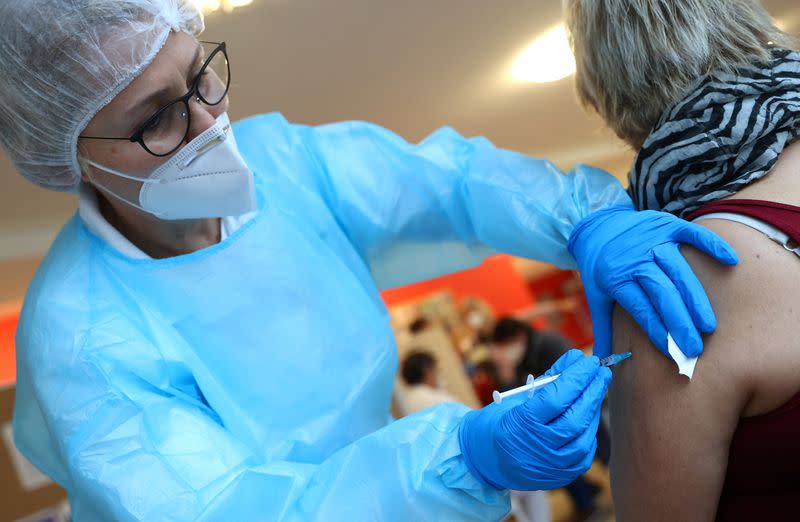By Francesco Guarascio and Andrius Sytas
BRUSSELS / VILNIUS (Reuters) – Some EU countries are receiving lower-than-expected doses of coronavirus vaccines as US pharmaceutical company Pfizer slows shipments, while Turkey and China move forward with inoculations amid increase in infections worldwide.
Six EU countries described the delay as unacceptable and said it affected the credibility of the entire vaccination process.
Frightened by a fast-spreading variant first detected in Britain, European governments imposed increasingly strict blockades and restrictions. They are pinning hopes on vaccines being launched across the continent.
But even when vaccines start en masse, the pressure on health systems is not expected to end for months, or until most people within a population get the vaccine.
The vaccine developed by Pfizer with the German partner BioNTech started to be delivered in the EU in late December. The American modern biotechnology company began making its attempt this week.
Still, about a third of the EU’s 27 governments cited “insufficient” doses in a video conference of health ministers on Wednesday, said a person who attended the virtual meeting with Reuters.
In a letter sent on Friday, six EU governments asked the European Commission to pressure Pfizer-BioNTech “to ensure the stability and transparency of (vaccine) deliveries in a timely manner”.
“This situation is unacceptable,” said the letter, seen by Reuters, signed by the ministers of health of Sweden, Denmark, Finland, Lithuania, Latvia and Estonia.
“Not only does this affect planned vaccination schedules, but it also diminishes the credibility of the vaccination process.”
Commission President Ursula von der Leyen said she spoke to Pfizer and was assured that scheduled deliveries will be made in the first quarter of 2021.
Pfizer said there would be a temporary impact on shipments from late January to early February, caused by changes in manufacturing processes to increase production.
“While this will have a temporary impact on shipments from late January to early February, it will provide a significant increase in the doses available to patients in late February and March,” said Pfizer in a statement.
TURKEY ADVANCES
The German health ministry said Pfizer informed the European Union that it would temporarily reduce deliveries due to construction work at its factory in the Belgian city of Puurs.
Belgium said it expects to receive only about half of the planned doses of the Pfizer vaccine in January. Lithuania said it was told this week that its supplies would be halved by mid-February.
Pfizer and BioNTech have two contracts with the EU to supply up to 600 million doses this year. They agreed to deliver 75 million doses in the second quarter and more by the end of the year.
Moderna has committed to deliver 10 million doses by the end of March and 35 million each in the second and third quarter. Another 80 million doses are also due to be delivered this year, but still without a defined schedule.
Turkey, which is not a member of the EU, said it vaccinated more than 600,000 people in the first two days of administering vaccines developed by China’s Sinovac Biotech, one of the world’s fastest implementations.
“We are a country experienced in implementing vaccination programs across the country … We will win the battle against the pandemic together,” tweeted Health Minister Fahrettin Koca.
Turkey vaccinated more people on the first day of its program on Thursday than France had vaccinated in the first three weeks.
The rise in infections is increasing pressure on China to strengthen its own vaccination rate at home, even though it has exported millions of doses of vaccines to countries like Turkey, Indonesia and Brazil.
In the first nine days of January, about 4.5 million doses were administered across the country in China, three times the number given from July to November, according to Reuters calculations based on official data. On January 13, more than 10 million doses were administered.
Two Chinese companies, Sinovac and Sinopharm, have developed vaccines. Sinopharm shipped more than 10 million doses domestically by January 4, while Sinovac delivered more than 7 million doses on January 10.
The dispersed shortage of vaccines emerged at the forefront of the U.S. battle against the pandemic on Friday, prompting at least one major health care system to cancel consultations for people waiting to be vaccinated.
President-elect Joe Biden will on Friday outline his plan to step up vaccines after an early implementation by the Trump administration, which he called “a terrible failure”.
The United States leads the world with the highest number of infections and deaths. Biden promised to carry 100 million vaccines in the arms of Americans during his first 100 days in office.
(Reporting by Reuters offices around the world; text by Nick Macfie; edited by Andrew Cawthorne and Peter Graff)
